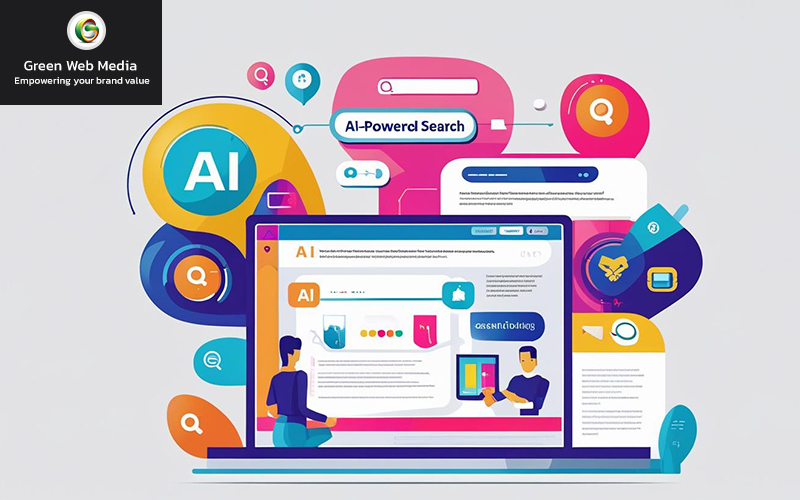How Google’s AI-Powered Search Engine Answers Your Doubts?

Google comes across as a vital knowledge enabler. It satisfies the thirst for information for people across the globe. When it fuses Artificial Intelligence into the search engine, the outcome is amazing. This is why the world knows it as a digital oracle capable of understanding the nuances of your questions and delivering tailored responses.
Google’s AI-Powered Search Engine is not just a search tool. It’s a next-gen tech solution the powers the future of online search.
From RankBrain to BERT, this blog explores the intricacies of how Google’s artificial intelligence interprets your search queries. Understand the seamless synergy between human inquiry and machine intelligence. Also, get to know how an SEO outsourcing company in India will help you with the integration.

The Evolution of Google’s AI-Powered Search Engine
The development of Google’s AI-Powered Search Engine is evidence of the industry’s unwavering commitment to quality in the digital sphere. It all started when Google released the RankBrain algorithm. This is the company’s first artificial intelligence project.
RankBrain was a pathfinder. It was built to understand the context of user searches and to learn and adjust to deliver more sophisticated answers continually. Google’s dedication to innovation kept up with the advancement of technology.
A breakthrough came with the development of BERT, or Bidirectional Encoder Representations from Transformers. The search engine was able to evaluate phrase patterns because of its machine-learning architecture. The structure gave it an unprecedented level of accuracy in understanding linguistic nuances.
The transition from RankBrain to BERT is an interesting evolution that demonstrates Google’s commitment to improving its AI algorithms. With such transition, it aims to produce a search engine that recognizes and foresees the ever-changing subtleties of human inquiry. This development showcases Google’s steadfast dedication in providing people with the best possible search experience.
Understanding RankBrain –
When it comes to Google’s AI-Powered Search Engine, comprehending RankBrain is similar to knowing the analytical skills of the engine. At its core, RankBrain is a pivotal component of Google’s AI arsenal. It is strategically deployed to enhance the efficacy of the search process.
When users submit queries, especially those veiled in ambiguity or novelty, RankBrain takes center stage. Its purpose is to use machine learning algorithms to understand the nuances of language. To do so, it interprets the context and meaning behind these inquiries.
RankBrain is the engine’s neural network. It continuously learns from each interaction to refine its understanding of the user’s intent. Its adaptive nature enables it to evolve over time.
Therefore, it can ensure a dynamic response to the ever-changing landscape of online inquiries. RankBrain’s evolution is not just a technological milestone. It’s a testament to Google’s commitment to creating an intuitive and user-centric AI-Powered Search Engine.
For businesses to navigate the digital terrain, they must understand how RankBrain operations are crucial. An affordable SEO company in India will leverage the power of RankBrain. It can strategically optimize content to align with the nuanced preferences of the search engine. This optimization is driven by the profound insights RankBrain provides. It is paramount to secure visibility in a highly competitive digital space.
As RankBrain continues to refine its cognitive capabilities, it becomes an indispensable ally for SEO outsourcing companies in India and across the globe. The symbiotic relationship between human-driven queries and the machine-learning process of RankBrain is reshaping the landscape of online search. This relation is making it imperative for businesses to embrace the transformative potential of AI in Google searches to stay ahead in the digital race.

Google Search using Natural Language Processing (NLP) –
Natural Language Processing (NLP) expertise at Google is a keystone of their AI system. The search engine is now able to understand and evaluate each detail of natural language through technical advancements. It excels at producing results that are appropriate for the context and at addressing complicated queries because of this quality.
As previously stated on Search Engine Land, Google’s NLP skills have substantially improved the conversational component of search. As a result, it allows users to formulate inquiries in a way that is more conversational and natural.
BERT: A Breakthrough in Contextual Understanding –
The emergence of BERT (Bidirectional Encoder Representations from Transformers) marks a groundbreaking chapter in contextual understanding. BERT represents a leap forward in deciphering the intricacies of language and user intent.
Unlike its predecessors, BERT approaches language comprehension bidirectionally. It considers the relationships between words in a sentence. This bidirectional analysis allows BERT to grasp the subtleties of context more effectively. It ensures a more accurate interpretation of user queries. The result is a search engine that not only comprehends the individual words in a search but also the nuances of how those words interact. This leads to more contextually relevant results.
For businesses eyeing strategic optimization, particularly in the context of an affordable SEO company, India, understanding BERT is paramount. BERT’s contextual understanding aligns seamlessly with the goal of providing users with precisely what they seek. SEO outsourcing companies in India can leverage BERT to optimize content. With BERT, businesses ensure it resonates with the nuanced preferences of the AI-Powered Search Engine.
The impact of BERT goes beyond mere search results. It revolutionizes the way businesses approach digital visibility. As the symbiotic relationship between user queries and BERT’s contextual prowess deepens, the role of an AI-Powered Search Engine in shaping online interactions becomes more pronounced. Embracing the transformative potential of BERT is not just a strategic move. It’s a proactive step towards staying at the forefront of a digital landscape where contextual understanding is the key to online prominence.
How AI enhances User Experience –
1. Personalized search results
Google’s AI-Powered Search Engine takes a tailored approach. To provide such an approach, it takes into account the user’s interests at first. The location and search history are also considered to give personalized search results. This level of customization makes sure that each user’s search results are unique. The feature improves the user experience overall.
2. Rich Snippets and Featured Snippets
AI is essential to the creation of featured and rich snippets. These brief and informative snippets give consumers rapid answers to their inquiries immediately on the search results page. It simultaneously reduces the need to navigate to other websites. This is in line with Google’s mission to provide a flawless customer experience in addition to saving time.
3. Voice Search Optimization
Google updated its search engine to accommodate speech inquiries better due to the increasing number of voice-activated devices. Users may engage with the search engine by utilizing voice commands because of AI technologies that enable accurate interpretation of spoken language. This supports the movement toward hands-free and voice-activated technology. The feature also opens up new avenues for convenient and accessible search.
The Final Thought
The way we obtain information online has changed dramatically as a result of Google’s AI-Powered Search Engine. AI integration, from RankBrain to BERT, has enhanced search accuracy. Plus, it has also altered the user experience.
Online search looks to become even more efficient. It seems to be even more tailored and intuitive in the future as Google develops and expands its artificial intelligence capabilities. Knowing the nuances of Google’s artificial intelligence (AI) in search is essential for companies looking to maximize their online visibility. The way we find and engage with information on the internet is constantly changing as a result of the cooperation of artificial and human intelligence.
If you want to improve your online presence, think about working with an affordable SEO company in India that is knowledgeable about the subtleties of AI-Powered Search Engines. Businesses must keep ahead of the digital curve due to the dynamic nature of SEO and Google’s dedication to innovation.

FAQs
1. How does Google’s AI understand the intent behind search queries?
Google’s AI, particularly RankBrain and BERT, utilizes machine learning and natural language processing. It assists in comprehending the context and intent behind search queries. The search engine adapts over time to interpret user intent accurately. For that, it analyzes the structure of sentences and learning from user interactions.
2. What role does ‘personalized search’ play in Google’s AI implementation?
Personalized search is a key component of Google’s AI strategy. The search engine considers factors such as a user’s search history and location. It also analyzes preferences to deliver customized and relevant search results. This personalized approach enhances the user experience by tailoring results to individual preferences.
3. How does BERT contribute to contextual understanding in search?
The BERT is also called Bidirectional Encoder Representations from Transformers. It is a machine learning framework. The framework analyzes the relationship between words in a sentence. BERT enhances the search engine’s ability to grasp the nuances of language. This is particularly true when handling complex queries and delivering contextually accurate results. This is carried out by understanding the context of words in both directions.
4. What impact does voice search optimization have on the user experience?
When powered by AI, voice search optimization enables users to interact with the search engine using voice commands. This aligns with the growing trend of voice-activated devices. It offers a portable, convenient way to access information. AI algorithms are crucial for accurately interpreting spoken language and delivering relevant results.






